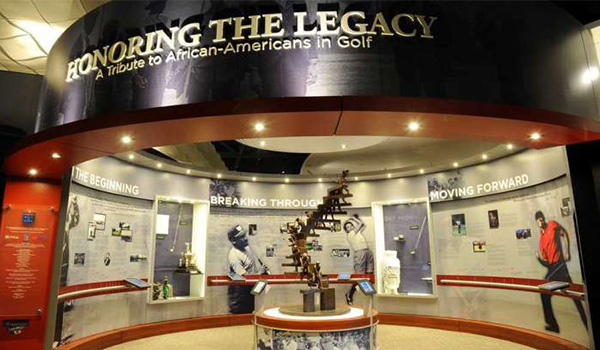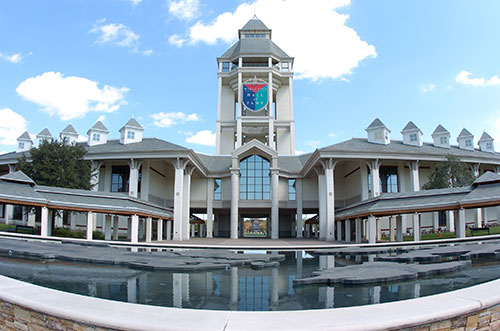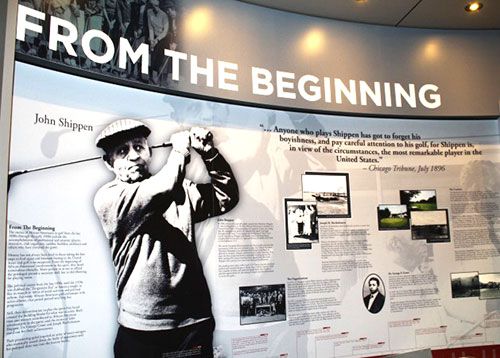On Friday, May 2, 2014, I visited the World Golf Hall of Fame, located in St Augustine, FL. The reason for the visit was to participate in the opening ceremony for “Honoring the Legacy: A Tribute to African Americans in Golf,” a story and exhibit capturing some of the significant accomplishments of African Americans in the game. The stories were gathered and written by Pete McDaniel, author of Uneven Lies, arguably the most recognized and accepted research/book on the topic of Black golf.

I guess there were about 100 people in attendance, including a representative from the offices of the Mayor of Jacksonville. Representatives from the three sponsoring organizations also spoke. The sponsoring organizations for the exhibit were the PGA Tour, PGA of America, and the USGA.
Pete spoke, as did Renee Powell and the great Charlie Sifford. There were several ambassadors for our cause in the audience, too, including Dr. Calvin Sinnette, Jim Dent, Earnie Ellison, Debert Cook, Wendell Haskins, Joe Barrow, Paula Tucker, Pepper Peete, Susan Wasser, Rhonda Glenn, Craig Bowen, Jeff Dunovant, Kennie Sims, Rodney Green and many more.
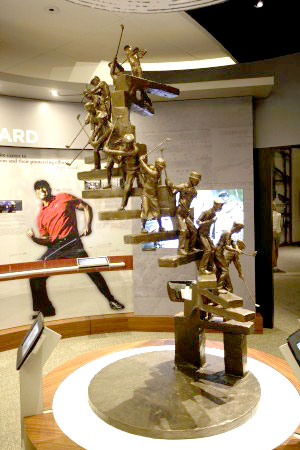 Photo Left: The centerpiece of the exhibit is an original sculpture, “The DNA of the Golf Swing,” designed by renowned sculptor Mario Chiodo and features 13 African-American golf legends.
Photo Left: The centerpiece of the exhibit is an original sculpture, “The DNA of the Golf Swing,” designed by renowned sculptor Mario Chiodo and features 13 African-American golf legends.
The most influential person to make this happen, in my opinion, was Steve Mona. Steve Mona is the CEO for the World Golf Foundation, the umbrella organization over the World Golf Hall of Fame, Golf 20/20, and The First Tee. At the ceremony he spoke to the significance of the exhibit/story, and briefly provided the assembled audience details on how the idea became reality.
In 2010 John Merchant was inducted into the National Black Golf Hall of Fame (NBGHOF), along with the late Barbara Douglas, and Winston Lakes Golf Course. [Read John Merchant’s Induction Speech]
A few weeks prior to the ceremony, which took place in Tampa, FL, John Merchant had an interview with Adam Schupak, who is a journalist/ writer for Golf Week Magazine. In the interview for the article John challenged the leaders in golf to mimic other major sports (i.e. Major League Baseball and the NBA) by creating a place for African American golf pioneers at the World Golf Hall of Fame. John delivered the same message during his acceptance speech on-stage in Tampa.
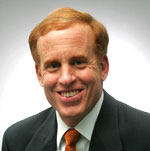 One year later, March 2011, Steve Mona (pictured left) was the keynote speaker at the NBGHOF dinner and induction ceremony. He delivered a moving speech, and towards the end publicly announced that he accepted the challenge from John Merchant, and that he would spearhead the effort to have the story of our Black golfing heroes proudly and PERMANENTLY displayed at the highest level…the World Golf Hall of Fame. It took several key meetings and three years to bring it to reality, but thanks to Steve Mona it finally is.
One year later, March 2011, Steve Mona (pictured left) was the keynote speaker at the NBGHOF dinner and induction ceremony. He delivered a moving speech, and towards the end publicly announced that he accepted the challenge from John Merchant, and that he would spearhead the effort to have the story of our Black golfing heroes proudly and PERMANENTLY displayed at the highest level…the World Golf Hall of Fame. It took several key meetings and three years to bring it to reality, but thanks to Steve Mona it finally is.
So what does that mean? To me, it is very significant. It means the leading golf agencies respect the contributions from our people enough to display it at the highest level. It means those visiting the Hall of Fame will know that Charlie Sifford and Tiger Woods weren’t the only people of color to contribute to golf. And please don’t take that to diminish the contributions from Charlie and Tiger. I would never do that.
 It means that generations from now, young people will better understand how a community of people persevered to compete in a sport/industry infamously known for not welcoming their contributions, or even their mere presence. Yet they did it anyway. Stories like these rekindle the human spirit. They embody the American dream that hard work, diligence, and faith always, always, always win in the end. These stories are not just a part of golf and/or African American history. They are a part of American history.
It means that generations from now, young people will better understand how a community of people persevered to compete in a sport/industry infamously known for not welcoming their contributions, or even their mere presence. Yet they did it anyway. Stories like these rekindle the human spirit. They embody the American dream that hard work, diligence, and faith always, always, always win in the end. These stories are not just a part of golf and/or African American history. They are a part of American history.
Photo left: John Merchant
I grew up in Chicago, IL, and began playing golf in 1969 at Pipe O’ Peace GC. I watched television, of course, and knew about Jack Nicklaus, Arnold Palmer, Gary Player, and other stars at that time. My heroes and role models, though, were the professional golfers I saw live and close up at Pipe O’ Peace. Cliff Brown, my early mentor, Pete Brown, James Black, Rufus “Big Daddy” James. Agnus Williams, Selma Barbour, and the Chicago Women’s Golf Club were heroes, too. In a sense, they were like surrogate parents; as were Rueben and Louise Horne. It does my heart good to know we now have a location to house these stories and recognize individuals like these.
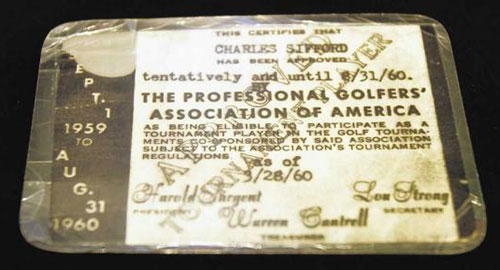
Photo above: Charlie Sifford’s 1960 PGA Player Card. The document that officially broke golf’s color barrier, is one of many items on display.
Thank you John Merchant for making the challenge. Thank you Pete McDaniel for authoring this important story. Thanks to everyone who played a part; both past and present. And I especially thank my friend Steve Mona for championing the cause, and for seeing it through.
* * * *
What are you doing to help bring diversity to golf? Are there things we can do together to accelerate the process? Please contact me to share your thoughts and opinions.
Send Michael a Comment!
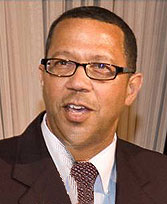 ABOUT MICHAEL COOPER, PH.D.
ABOUT MICHAEL COOPER, PH.D.
Dr. Michael W. Cooper is the Campus Director for Springfield College-Tampa Bay campus. Contact him at mcooper2@springfieldcollege.edu.

